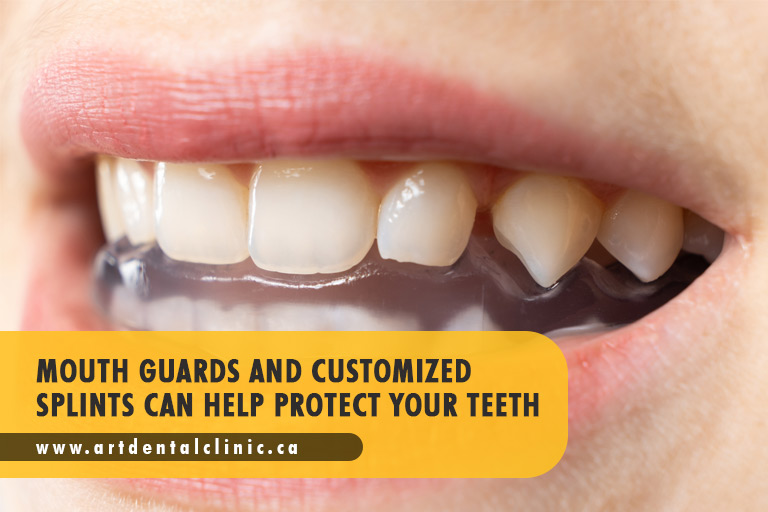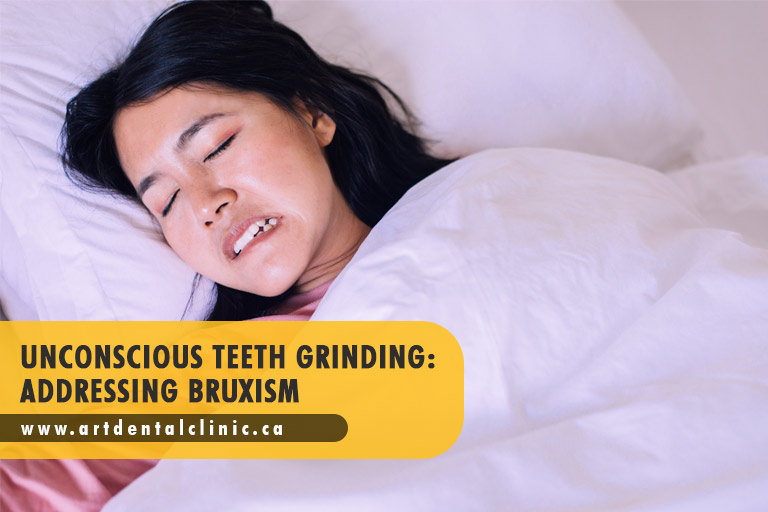A prevalent but frequently undetected dental concern that impacts a significant portion of the population and often occurs during night-time, is bruxism or teeth grinding. For many, this habit goes unnoticed until it triggers a series of troublesome issues.
Learn here the signs of teeth grinding, those most prone to it, and the various treatments available to address this perplexing concern.
Signs of Bruxism

Bruxism can manifest in several ways, leading to both dental and overall health issues. Check out these signs to know if you or your partner may have bruxism:
- Bothered Partner: Frequent teeth grinding can create an irritating grinding noise that may disrupt your partner’s sleep and lead to relationship tension.
- Headaches: Consistent teeth grinding in your sleep can result in chronic headaches, particularly in the morning.
- Earache and Vertigo: Bruxism can contribute to ear pain and dizziness, often caused by the pressure applied to the jaw joint.
- Sleep Disruption: Unconscious grinding can lead to sleep disruption, potentially causing daytime fatigue and irritability.
- Muscle, Jaw, and Neck Pain: Excessive pressure on your jaw muscles and joints can result in muscle tension and discomfort that may radiate to your face, jaw, and neck.
- Tooth Sensitivity: Teeth grinding can wear down the tooth enamel, which increases tooth sensitivity to cold and hot temperatures.
- Damaged Teeth: The constant grinding can result in chipped, cracked, or worn-down teeth, potentially requiring dental interventions like dental crown treatment.
People Prone to Teeth Grinding
Bruxism can affect anyone, but certain individuals are more prone to this condition due to various factors. Those at a higher risk for teeth grinding include:
- Antidepressant Users: Some medications, especially certain antidepressants, can trigger bruxism as a side effect.
- Genetically Predisposed: Your family history can also come into play when it comes to bruxism, hinting at a possible genetic connection.
- Diagnosed with Certain Conditions: People dealing with conditions, like dementia, are at a higher risk of experiencing teeth grinding.
- Alcohol or Caffeine Abusers: Consuming too much alcohol or caffeine can up your chances of grinding your teeth. Additionally, even recreational drugs and tobacco use may also contribute to teeth grinding.
- Having a Sleep Disorder: If you’re dealing with sleep disorders like nocturnal asthma and sleep apnea, you’re at a higher risk for teeth grinding.
- Stressed: High levels of stress can contribute to teeth grinding, making relaxation techniques important in prevention.
Treatments

Addressing bruxism requires a multi-faceted approach to reduce the impact of this habit. Here are various treatments that can help manage and alleviate bruxism:
- Botox: Botox injections into the jaw muscles can temporarily paralyze them, reducing the intensity of grinding.
- Stress Relief: Practicing stress reduction techniques, such as meditation, yoga, and mindfulness, can significantly decrease bruxism in individuals who grind due to stress.
- Good Sleep: Improving your sleep quality through better sleep hygiene and addressing sleep disorders can help prevent nighttime teeth grinding. Here are 4 tips to boost your sleep quality:
- Improve Your Sleep Comfort With Quality Bedding
Choosing the right mattress and bedding is all about ensuring that you have a cozy and comfortable haven to retreat to at the end of the day.
A supportive mattress and a fluffy pillow are your allies in ensuring your spine receives the right support, keeping those aches and pains at bay.
Your choice of sheets and blankets is also crucial. Opt for bedding that feels soft and soothing to the touch, something you can’t wait to snuggle into. Also, consider bedding that helps regulate temperature, ensuring you stay comfortably snug throughout the night.
- Create a Dark and Cozy Sleep Environment
By avoiding bright lights, you’re signalling to your body that it’s time to wind down, encouraging the production of melatonin, a hormone that naturally promotes sleep; so dim the lights and create your perfect sleep sanctuary.
- Boost Your Day with 30 Minutes of Natural Sunlight
Sunlight, specifically, also has a substantial impact on your circadian rhythm, helping it operate smoothly, so make it a daily practice to soak up natural sunlight.
Whether you take a short stroll outside, open your windows, or draw back the blinds, you’re gently encouraging your body to reset its internal body clock and synchronize with the world around you.
If, for any reason, you can’t access natural light easily, there’s no need to worry. Simply consult your doctor about the potential use of a light therapy box as an alternative. Your overall well-being and energy levels will certainly benefit from this approach.
- Give Your Brain a Break From Devices
Tablets, smartphones, and laptops can keep your mind buzzing, making it challenging to unwind. What’s more, these gadgets can disrupt your body’s melatonin production solely due to their emitted light.
Make a conscious effort to take a break from these devices; at least an hour before bedtime. This practice can assist your brain in winding down, setting the stage for a peaceful and restorative night’s sleep.
- Occlusal Device: In severe cases, your dentist can create personalized occlusal devices known as splints, which are akin to mouth guards. These are designed to shield your teeth from the impacts of grinding.
- Medication Reevaluation: If medication side effects are causing bruxism, consult with your healthcare provider to explore alternative medications.
- Transcutaneous Electrical Nerve Stimulation (TENS): TENS therapy can help relax jaw muscles and relieve bruxism-related discomfort.
- Physical Therapy: In some cases, physical therapy can alleviate the muscle tension associated with bruxism.
- Medication: In severe cases, a dentist, orthodontist, or healthcare provider may prescribe muscle relaxants or medications to manage bruxism.
Unconscious teeth grinding, a common yet often overlooked dental concern, can have a significant impact on both your oral and overall health. Don’t underestimate its effects. Reach out to a dentist in Waterloo who can provide you with a personalized treatment plan and guidance.
Contact Art Dental Clinic today at (519) 747-9797 for a comprehensive evaluation. By addressing bruxism with the right approach, you can effectively manage this condition, improving your overall well-being, and safeguarding your dental health. Don’t wait; take the first step towards a healthier, happier smile today.

